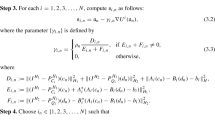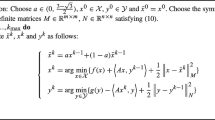Abstract
We introduce four novel relaxed CQ algorithms with alternating inertial for solving split feasibility problems in real Hilbert spaces. The proposed algorithms employ a new non-monotonic adaptive step size criterion and utilize two different step sizes in each iteration. The weak convergence of the iterative sequences generated by the proposed algorithms is established under some weak conditions. Moreover, the Fejér monotonicity of the even subsequence with respect to the solution set is recovered. Two applications in signal denoising and image deblurring are given to illustrate the computational efficiency of our algorithms.












Similar content being viewed by others
Data Availability
The datasets generated during and/or analyzed during the current study are available from the corresponding author.
Notes
Available on the website https://www.tau.ac.il/~becka/home
Download from the website http://www.imageprocessingplace.com/downloads_V3/root_downloads/image_databases/standard_test_images.zip
Access via the website http://www.imm.dtu.dk/~pcha/HNO/HNO.zip
References
Censor, Y., Elfving, T.: A multiprojection algorithm using Bregman projections in a product space. Numer. Algorithms 8, 221–239 (1994)
Xu, H.K.: Iterative methods for the split feasibility problem in infinite-dimensional Hilbert spaces. Inverse Problems 26, article no. 105018 (2010)
Bauschke, H.H., Borwein, J.M.: On projection algorithms for solving convex feasibility problems. SIAM Rev. 38, 367–426 (1996)
Byrne, C.: Iterative oblique projection onto convex sets and the split feasibility problem. Inverse Problems 18, 441–453 (2002)
Byrne, C.: A unified treatment of some iterative algorithms in signal processing and image reconstruction. Inverse Problems 20, 103–120 (2004)
Censor, Y., Bortfeld, T., Martin, B., Trofimov, A.: A unified approach for inversion problems in intensity-modulated radiation therapy. Phys. Med. Biol. 51, 2353–2365 (2006)
Gibali, A., Sabach, S., Voldman, S.: Non-convex split feasibility problems: models, algorithms and theory. Open J. Math. Optim. 1, article no. 1 (2020)
Brooke, M., Censor, Y., Gibali, A.: Dynamic string-averaging CQ-methods for the split feasibility problem with percentage violation constraints arising in radiation therapy treatment planning. Int. Trans. Oper. Res. 30, 181–205 (2023)
Shehu, Y., Gibali, A.: New inertial relaxed method for solving split feasibilities. Optim. Lett. 15, 2109–2126 (2021)
Shehu, Y., Dong, Q.L., Liu, L.L.: Global and linear convergence of alternated inertial methods for split feasibility problems. Rev. R. Acad. Cienc. Exactas Fís. Nat. Ser. A Math. RACSAM 115, article no. 53 (2021)
Dong, Q.L., Liu, L.L., Yao, Y.H.: Self-adaptive projection and contraction methods with alternated inertial terms for solving the split feasibility problem. J. Nonlinear Convex Anal. 23, 591–605 (2022)
Yang, Q.: The relaxed CQ algorithm solving the split feasibility problem. Inverse Problems 20, 1261–1266 (2004)
Qu, B., Xiu, N.: A note on the CQ algorithm for the split feasibility problem. Inverse Problems 21, 1655–1665 (2005)
Xu, H.K.: A variable Krasnosel’skiǐ-Mann algorithm and the multiple-set split feasibility problem. Inverse Problems 22, 2021–2034 (2006)
López, G., Martín-Márquez, V., Wang, F., Xu, H.K.: Solving the split feasibility problem without prior knowledge of matrix norms. Inverse Problems 28, article no. 085004 (2012)
Reich, S., Tuyen, T.M.: A new approach to solving split equality problems in Hilbert spaces. Optimization 71, 4423–4445 (2022)
Bauschke, H.H., Combettes, P.L.: Convex Analysis and Monotone Operator Theory in Hilbert Spaces, 2nd edn. Springer, Berlin (2017)
Hendrickx, J.M., Olshevsky, A.: Matrix \(p\)-norms are NP-hard to approximate if \(p \ne 1,2, \infty \). SIAM J. Matrix Anal. Appl. 31, 2802–2812 (2010)
Zhang, W.X., Han, D.R., Li Z.: A self-adaptive projection method for solving the multiple-sets split feasibility problem. Inverse problems 25, article no. 115001 (2009)
Dong, Q.L., Tang, Y.C., Cho, Y.J., Rassias, T.M: “Optimal" choice of the step length of the projection and contraction methods for solving the split feasibility problem. J. Global Optim. 71, 341–360 (2018)
Gibali, A., Liu, L.W., Tang, Y.C.: Note on the modified relaxation CQ algorithm for the split feasibility problem. Optim. Lett. 12, 817–830 (2018)
Gibali, A., Mai, D.T., Vinh, N.T.: A new relaxed CQ algorithm for solving split feasibility problems in Hilbert spaces and its applications. J. Ind. Manag. Optim. 15, 963–984 (2019)
Sahu, D.R., Cho, Y.J., Dong, Q.L., Kashyap, M.R., Li, X.H.: Inertial relaxed CQ algorithms for solving a split feasibility problem in Hilbert spaces. Numer. Algorithms 87, 1075–1095 (2021)
Ma, X., Liu, H., Li, X.: Two optimization approaches for solving split variational inclusion problems with applications. J. Sci. Comput. 91, article no. 58 (2022)
Polyak, B.T.: Some methods of speeding up the convergence of iteration methods. U.S.S.R. Comput. Math. Math. Phys. 4, 1–17 (1964)
Nesterov, Y.: A method for solving the convex programming problem with convergence rate \(O\left(1 / k^{2}\right)\). Dokl. Akad. Nauk SSSR 269, 543–547 (1983)
Beck, A., Teboulle, M.: A fast iterative shrinkage-thresholding algorithm for linear inverse problems. SIAM J. Imaging Sci. 2, 183–202 (2009)
Yang, J., Liu, H.: Strong convergence result for solving monotone variational inequalities in Hilbert space. Numer. Algorithms 80, 741–752 (2019)
Tan, B., Cho, S.Y.: Inertial extragradient algorithms with non-monotone stepsizes for pseudomonotone variational inequalities and applications. Comput. Appl. Math. 41, article no. 121 (2022)
Mu, Z., Peng, Y.: A note on the inertial proximal point method. Stat. Optim. Inf. Comput. 3, 241–248 (2015)
Iutzeler, F., Malick, J.: On the proximal gradient algorithm with alternated inertia. J. Optim. Theory Appl. 176, 688–710 (2018)
Iutzeler, F., Hendrickx, J.M.: A generic online acceleration scheme for optimization algorithms via relaxation and inertia. Optim. Methods Softw. 34, 383–405 (2019)
Shehu, Y., Iyiola, O.S.: Projection methods with alternating inertial steps for variational inequalities: weak and linear convergence. Appl. Numer. Math. 157, 315–337 (2020)
Shehu, Y., Dong, Q.L., Liu, L.L.: Fast alternated inertial projection algorithms for pseudo-monotone variational inequalities. J. Comput. Appl. Math. 415, article no. 114517 (2022)
Beck, A.: First-Order Methods in Optimization. MOS-SIAM Series on Optimization, vol. 25. Society for Industrial and Applied Mathematics (SIAM), Philadelphia (2017)
Opial, Z.: Weak convergence of the sequence of successive approximations for nonexpansive mappings. Bull. Amer. Math. Soc. 73, 591–597 (1967)
Osilike, M.O., Aniagbosor, S.C.: Weak and strong convergence theorems for fixed points of asymptotically nonexpansive mappings. Math. Comput. Model. 32, 1181–1191 (2000)
Cai, X., Gu, G., He, B.S.: On the \(O(1/t)\) convergence rate of the projection and contraction methods for variational inequalities with Lipschitz continuous monotone operators. Comput. Optim. Appl. 57, 339–363 (2014)
Korpelevich, G.M.: The extragradient method for finding saddle points and other problems. Èkonom. i Mat. Metody 12, 747–756 (1976)
Beck, A., Guttmann-Beck, N.: FOM-a MATLAB toolbox of first-order methods for solving convex optimization problems. Optim. Methods Softw. 34, 172–193 (2019)
Dolan, E.D., Moré, J.J.: Benchmarking optimization software with performance profiles. Math. Program. 91, 201–213 (2002)
Wang, Z., Bovik, A.C., Sheikh, H.R., Simoncelli, E.P.: Image quality assessment: from error visibility to structural similarity. IEEE Trans. Image Process. 13, 600–612 (2004)
Acknowledgements
The authors would like to thank the handling editor and the anonymous referee for careful reading and constructive comments, which improved the quality of the manuscript.
Funding
Bing Tan was supported by the China Scholarship Council (CSC No. 202106070094). Xianfu Wang was partially supported by the Natural Sciences and Engineering Research Council of Canada.
Author information
Authors and Affiliations
Contributions
All authors have equal contributions.
Corresponding author
Ethics declarations
Ethical approval
Not applicable.
Conflict of interest
The authors declare no competing interests.
Additional information
Publisher's Note
Springer Nature remains neutral with regard to jurisdictional claims in published maps and institutional affiliations.
Rights and permissions
Springer Nature or its licensor (e.g. a society or other partner) holds exclusive rights to this article under a publishing agreement with the author(s) or other rightsholder(s); author self-archiving of the accepted manuscript version of this article is solely governed by the terms of such publishing agreement and applicable law.
About this article
Cite this article
Tan, B., Qin, X. & Wang, X. Alternated inertial algorithms for split feasibility problems. Numer Algor 95, 773–812 (2024). https://doi.org/10.1007/s11075-023-01589-8
Received:
Accepted:
Published:
Issue Date:
DOI: https://doi.org/10.1007/s11075-023-01589-8
Keywords
- Split feasibility problem
- CQ method
- Projection and contraction method
- Alternated inertial method
- Signal processing
- Image restoration




